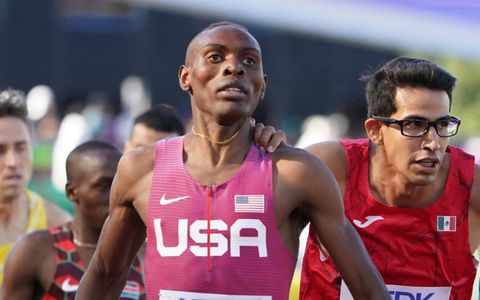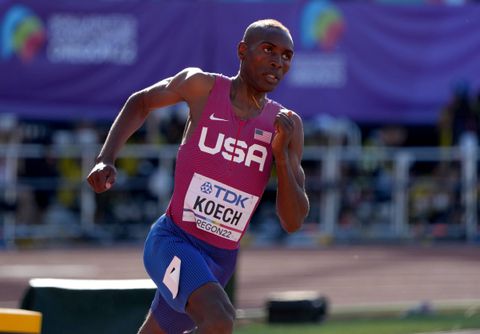Just days before the race, Jonah Koech wasn’t even meant to be in Rabat Diamond League. His name was absent from the original 800m entry list, despite having quietly put together an impressive resume over the past year.
His coach, Tom Brumlik, was left stunned when he saw Koech’s name missing and scrambled to appeal the decision. A late, unlikely spot in the 1500m, a distance where Koech’s 3:37 personal best sat miles behind the usual Diamond League standard.
It was a long shot. A field stacked with 17 runners, two pace-setters, and a meeting director, Jean-Pierre Watelle, who had already rejected Koech’s 800m entry. But this time, Watelle took a gamble.
What followed was a Hollywood-script-worthy last lap. Koech stormed from 13th to first in 405 meters, clocking one of the most shocking Diamond League wins in history.
Breaking Barriers Beyond the Track
Koech’s victory wasn’t just personal redemption. It was historic. He became the first Under Armour-sponsored athlete to ever win a Diamond League race in any running discipline. He didn’t shy away from the moment either, proudly pointing to the UA logo on his kit and raising his shoes in celebration.
The win also placed him among elite company, just the third American man to win a Diamond League 1500m or mile race, joining the likes of Leo Manzano and Yared Nuguse. And he did it as the slowest entrant on paper. Of the 27 men who’ve claimed Diamond League 1500m or mile victories, none had arrived with a PB as modest as Koech’s 3:37.27.
Even his agent, Peter Wolters, admitted as quoted by Essentially Sports.
“Honestly, with that 3:37 PB, he had no reason to be in this race. It took a little bit of convincing.”
Why the Diamond League Needs More of This

Track and field thrives on rivalries, world records, and household names, but it’s moments like this that truly capture the sport’s heart. Jonah Koech proved that hidden talents exist beyond the established pecking order. His story is a reminder that stats don’t always tell the full tale, and that there’s magic in giving long shots a lane.
The Diamond League’s rigid qualifying system has long been criticized for its exclusivity. Yes, it protects quality fields, but it often sidelines athletes on the cusp of breaking through. Koech’s win is proof that sometimes, taking a risk on an overlooked runner can deliver the most compelling, goosebump-inducing moments of the meet.
Coach Tom Brumlik put it best.
“He’s always been insanely talented… 1500 has always been a distance that he just has never quite got the right opportunity.” That opportunity came in Rabat, and Koech didn’t waste it.
If the Diamond League wants to stay fresh, relevant, and unpredictable, it must leave room for stories like Jonah Koech’s. Not every athlete comes with a glittering résumé, but given the chance, some will rise above expectations and light up the track.
The sport needs its stars, but it also desperately needs its underdogs.


